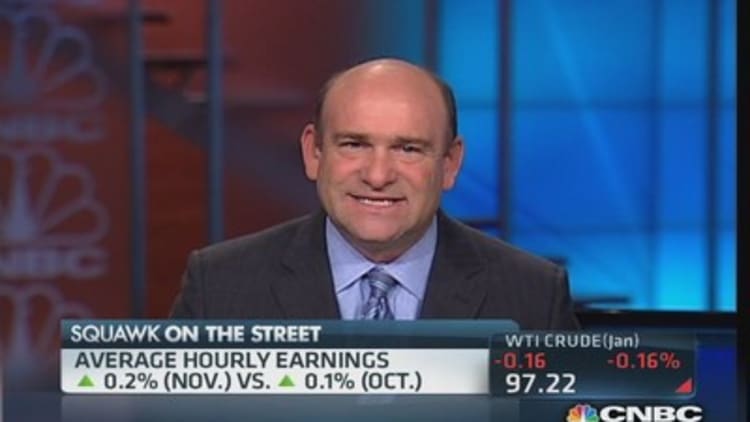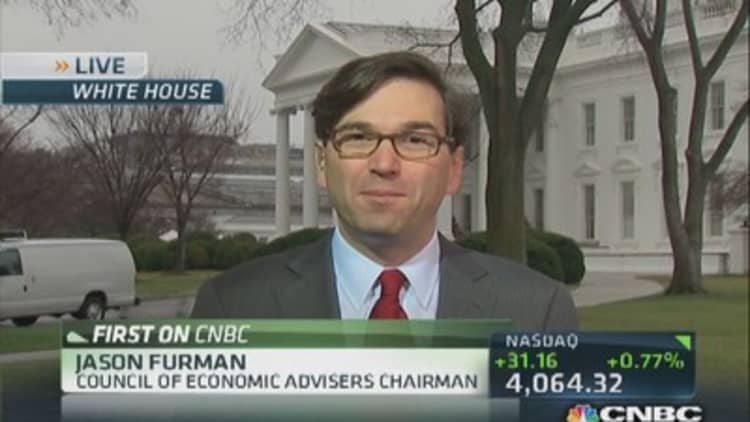So it appears like all the bumbling in Washington has not yet managed to crush the U.S. economy.
Friday's Labor Department report, showing a gain of 203,000 positions and a drop in the unemployment rate to a five-year low of 7 percent, contained unambiguous good news.
Some reports you can quibble with if they include big downward revisions to previous months or if discouraged workers left the labor force, driving down unemployment for the wrong reason. Neither happened in the November report.
The Labor Department also revised upward the two previous months by a combined 8,000 and the civilian labor force expanded by 455,000. Hours worked and hourly wages also edged higher.
(Read more: Yes, more jobs, but wage growth holds up recovery)
The combined takeaway is that all the headwinds out of D.C., including the October shutdown and debt limit scare, have thus far failed to throw the economy off its path to a relatively stronger 2014. The unemployment rate appears headed toward a more normal historical level by 2015. But there is still plenty of time for D.C. to wreck everything.

Some of the uptick in job creation and rosy outlooks for 2014 are based on the idea that the threat of crisis out of D.C. is largely over and that politicians may also figure out a way to avoid another big round of blunt spending cuts to start the year.
But it's too soon to count on either thing happening.
Congressional negotiators led by House Budget Chairman Paul Ryan, R- Wis., and Senate Budget Chairwoman Patty Murray, D-Wash., are reportedly near a deal to reprogram the sequester cuts for 2014 in a way that will be less damaging to economic growth. But finalizing such deals is very tricky with conservative Republicans not wanting to give up prized spending reductions and liberals demanding full sequester repeal.
(Read more: 2014: The year the economy clicks)
And while it is true that a shutdown and debt ceiling fight are not likely early next year, they cannot be ruled out. And in fact the scarier of the two, a debt limit battle, is actually more likely.

Most Republicans acknowledge they lost the shutdown battle and do no want to repeat the mistake. So some continuing resolution to fund the government, whether with sequester changes or not, is likely to get through in January. But for many House conservatives, raising the debt limit is extraordinarily difficult without winning some major policy concessions.
And once again, the House GOP caucus, sensing a powerful midterm election-year issue, may demand Obamacare changes in return for a debt limit hike. And that's one issue where Democrats and the White House are unwilling to give even the slightest ground for fear it would set a dangerous precedent.
The result is that D.C. is likely to remain a weight on the economy in 2014—certainly not producing anything helpful on tax and immigration reform—and possibly a real debilitating factor.
(Read more: 2014 will center on the Fed, Gross says)
"There's probably not going to be a shutdown," said Catherine L. Mann, a Brandeis professor and long-time Washington political veteran. "But you will have some people in the GOP who can't resist fighting on the debt ceiling because it just means so much to them."
And Friday's positive jobs report also makes it less likely that the GOP will agree to extend emergency jobless benefits. Whatever one believes about the efficacy of extending benefits to the long-term jobless, taking them away amounts to immediate fiscal drag as less money gets spent in the economy.
The White House on Friday tried to make the case that all the gains in the jobs report came from the short-term rather than long-term unemployed. And while that argument may be correct, it's probably too nuanced to overcome Republican opposition to extending jobless benefits.
(Read more: Obama aide: Help long-term unemployed)
—By Ben White. White is POLITICO's chief economic correspondent and a CNBC contributor. He also authors the daily tip sheetPOLITICO Morning Money. Follow him on Twitter @morningmoneyben.


